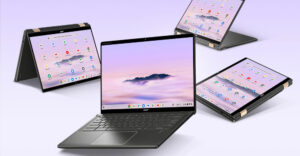
I’m writing this from the Microsoft Management Summit at Interop with 5,000 of my closest friends in Las Vegas, and I’m still thinking about the book I brought up recently, titled Inside Steve’s Brain. The result is, I think I’ve had an epiphany (and no, I didn’t call a doctor).
I realized that for all Apple’s impressive success, I was watching Microsoft demonstrate capabilities that are as far from what Apple is capable of doing as I am from writing the Great American Novel. Yet currently, while Microsoft is still more powerful than Apple, Apple overshadows Microsoft in many critical areas we personally care about.
Given many are struggling with the decision to move to Vista, stay with XP or try out Apple (sorry Linux folks, I’m seeing no real momentum on desktop Linux yet), I figured it would be fun to contrast Steve Jobs with Microsoft’s CEO, Steve Ballmer, and explain why both may be unable to reach the success they uniquely would like to achieve.
For Ballmer, I think he would like the financial performance that Bill Gates used to demonstrate and Jobs largely enjoys; for Jobs, I think he’d like to truly make a dent in the universe (taken directly out of the Brain book), which, for good or bad, Microsoft clearly does, while currently he is mostly selling the technology equivalent of sugared water (from a comment Jobs made to John Sculley when he recruited him from Pepsi to run Apple).
We’ll close with the product of the week, which is one of the first cloud-based offerings designed for Apple the right way, from the ground up by a dedicated Apple team, that truly protects your most valuable non living assets.
Contrasting Steve Jobs and Steve Ballmer
Jobs is like a master craftsman. The first things he did when he took over at Apple were get rid of the bozos (underperformers), massively simplify the company and its products, and force tightly integrated products that approach — and sometimes surpass — amazing. To Jobs, the customers are end users who don’t really know what they want (he correctly doesn’t use research — specifically focus groups — to create great products); IT is made up of bozos who should be ignored; and excellence is defined as well-integrated products and services that catch your breath every time you use them.
Ballmer is a master salesman. One of the first things he did when he took over at Microsoft was meet with his top people and realign the company against distinct customer groups. To Ballmer, the customer is the IT Buyer for most of the company, someone else worries about the user, and excellence is defined by financial performance as defined by sales volume (but often not profitability).
Where Jobs gets stuck is that he doesn’t get that in the PC segment, for about 70 percent of the market, IT gets the “No” vote, and they are understaffed and overworked, not “bozos.” In addition, while he is a craftsman, he really doesn’t represent the average user, nor is he an engineer — so products, while beautiful, often lack capabilities that many require because Jobs doesn’t see the requirement.
In his world there are no gyms, public transportation systems or places where you can’t plug into power, and US$500 to Jobs is like $1 to most of us. This is a problem because he drives many of the major product decisions based on his values, and his products remain largely isolated from the mainstream market as a result.
Where Ballmer gets stuck is he doesn’t get that for all of the PC market, users get the “yes” vote, and it doesn’t matter that you build a PC product for IT if the user doesn’t want it. In addition, while he is capable of managing a massively complex company, he doesn’t get that image is 100 percent of reality, that the “build it and they will come” model only works in movies, and that profitability is more important for most of us than sales.
In Ballmer’s world, people buy solutions, and the management and control of a product — not the user experience — defines it. This is a problem because no one vendor actually owns the quality for most of the Microsoft solutions, and — particularly on the desktop — this prevents a Windows OEM (original equipment manufacturer) from creating a product that can approach Apple quality levels. This is probably why Vista and Office 2007 are not popular with their target market.
Driving Success for the “Steves”
For Jobs to “make a dent in the universe,” he needs to scale up massively and probably partner more aggressively so he can offer a more complete solution. IBM is testing the deployment of Apple hardware and was key to Microsoft’s growth. It may represent a good partner for Apple if Apple can continue to assure the quality of the final result. Basically, he needs to find a way to embrace the business user and the IT staff that supports that user while continuing to ensure the high quality and customer satisfaction for which he is famous.
For Ballmer, he needs to focus back on ensuring the quality of what his company offers in the eyes of the user and become passionate about the bottom-line performance of each of his varied units. Basically, he needs to focus back on the management fundamentals, revitalize Microsoft’s marketing and create the kind of quality across Microsoft that already is being demonstrated by Apple and his own server and tools business. It might also be wise if he stopped Apple’s active campaign to disparage his key products.
However, given that Microsoft is after Google and Google’s Android represents the biggest threat to the iPhone, it occurred to me that the more interesting path might be a deeper partnership between the two companies, with Microsoft focusing on the back end and Apple focusing on the user. That way, both companies could work to hold off the bigger threat that Google represents and use each other’s strengths to overcome the other’s weaknesses.
That was my epiphany, hope you enjoyed it.
Product of the week: Mozy for the Mac
One of the things that make Microsoft Office for the Mac stand out is that it is developed by a group focused on Apple that reports into Microsoft hardware, and not the Office software group. When Microsoft made this change, the result was a change from a crappy (technical term) Apple product to one that I’ve often thought to be better than Microsoft’s Windows version. This taught me that the only way to do Apple products right is to have a dedicated team, and that is exactly what Mozy used to create its OS X backup offering.
Because our data is far more valuable than the hardware it resides on, backup offerings should be a critical part of any consumer or corporate desktop offering. I’m often struck by how many people I know who have had a catastrophic data loss and then called me for a solution only to find out that because they hadn’t used a good backup product, their choices were limited and often very expensive.
For those who lost their stuff in floods, fires or other catastrophic events, even expensive disk recovery efforts weren’t adequate, and local backup solutions weren’t much help. This is why a cloud-based solution like Mozy’s is my most common recommendation.
Free for under 2 gigabytes and under $5 a month for unlimited storage, this now represents one of the best values for both Windows and Apple users who need to protect their data against loss or catastrophic hard drive failure. And because Mozy designed its solution the right way, by using a team dedicated to designing for Apple, the new Apple offering is my product of the month.
Rob Enderle is a TechNewsWorld columnist and the principal analyst for the Enderle Group, a consultancy that focuses on personal technology products and trends.




















































How can it be claimed that Apple has marketing problems when the iPod has sewn up the music-player market, iTube dominates the digital-delivery market, and the iPhone has, essentialliny instantly, captured much of the fast-expanding smartphone market? Plus, mac market share, while still a sliver, continues to expand, as does Safari, and begins to make inroads into businesses.
Ballmer is a master salesman? Did you see the "I love this company" video? Have you watched a MacWorld keynote lately?
Apple needs to partner? Why? How would partnering have improved iTunes? The iPod? Apple partners out the things it doesn’t do as well, like manufacturing. But it would allow others to meddle with what it does do well at its own peril.
Even products that are criticized, such as the iPod in the past and the MacBook Air in present times (and with the significant exception of the Cube), hit big. Although the Mac TV hasn’t hit yet, the groundwork Apple is laying for the product is obvious.
I agree with your criticisms of Ballmer. Apple, though, doesn’t need Microsoft’s size, expertise, or market share today. Apple seems content to crank out excellent products, knowing full well that the market will find it rather than the other way around. This method has succeeded for the past five years (arguably for the past ten, and also succeeded for Pixar). Unless management blows the product line or build quality dips, this kind of growth can continue indefinitely.
If you end up on top of the world, who cares whether you take one year or ten years to get there?
I would say Steve J. has made a "dent on the Universe" or "changed the world" as I think his quote to Sculley went. He has been at the forefront of bringing the personal computer into the lives of everyday people, dramatically changing how we use and interact with computers, revolutionized how we BUY and listen to music, and now with the iPhone, completely changed what we think a phone should do. I think the dent is so big, you don’t even see it.
Ballmer on the other hand does seem to be selling sugared water… and making billions at it.